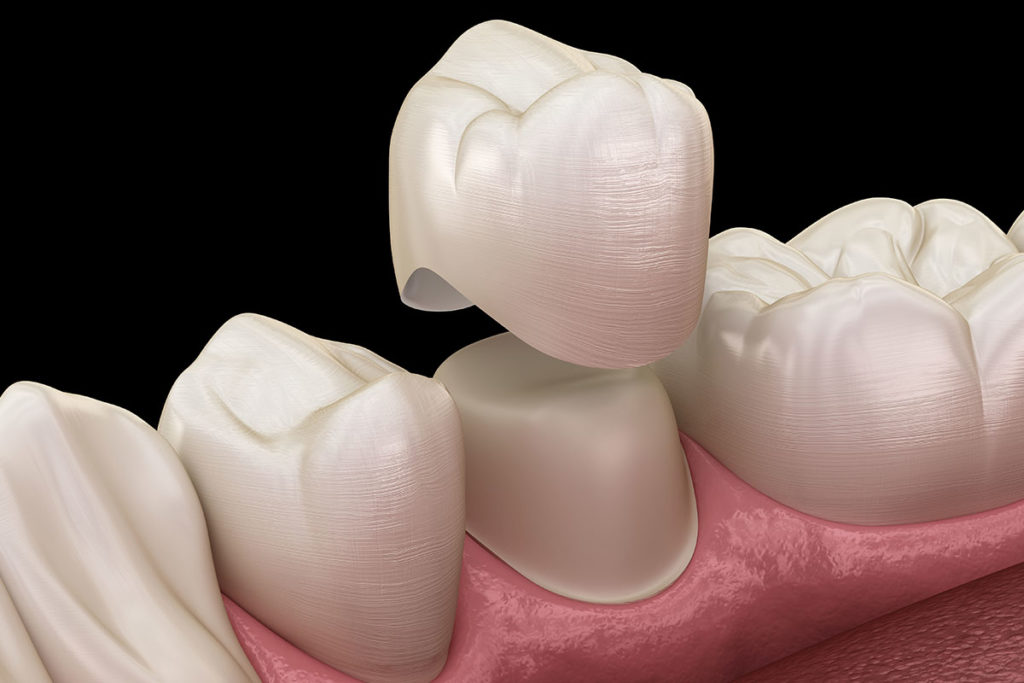A smile can light up a room, but what happens when one of those radiant teeth gets damaged or decayed? Enter the world of Dental Crowns – a restorative solution that not only brings back the functionality of the tooth but also its aesthetic appeal. From Tooth Cap procedures to the elegance of Ceramic Crowns, let’s delve into how dental crowns are revolutionizing smile restorations.
Understanding Dental Crowns
Dental crowns, often referred to as ‘caps’, are prosthetic devices that encase the entire visible part of a tooth. They are cemented onto existing teeth or implants and can only be removed by a dentist. Crowns serve multiple purposes:
- Restoring Strength: They provide strength to a damaged or weakened tooth, ensuring it can function normally.
- Aesthetic Appeal: Crowns restore the shape, alignment, and appearance of the tooth.
- Protection: They protect a weak tooth from breaking or hold together parts of a cracked tooth.
The Elegance of Ceramic Crowns
Among the various materials used for crowns, ceramic stands out for several reasons:
- Natural Appearance: Ceramic crowns mimic the translucency and color of natural teeth, making them an excellent choice for front teeth.
- Biocompatibility: They are metal-free, reducing the risk of allergic reactions.
- Durability: Modern ceramics are incredibly durable, ensuring the crown lasts for a long time with proper care.

The Process of Getting a Dental Crown
- Consultation: The first step involves a thorough examination, possibly with dental x-rays, to determine the need and suitability for a crown.
- Preparation: The dentist reshapes the tooth to make space for the crown. An impression of the tooth is then taken.
- Creation: The crown is custom-made in a dental lab based on the impression.
- Placement: Once ready, the crown is cemented onto the reshaped tooth.
Caring for Your Dental Crown
- Oral Hygiene: Regular brushing, flossing, and dental cleanings ensure the longevity of the crown.
- Avoid Hard Foods: Biting down on hard foods can damage ceramic crowns.
- Regular Check-ups: Routine visits to the dentist help in early detection of any issues with the crown.
Casey Dental: Your Partner in Smile Restoration
At Casey Dental, we understand the importance of a radiant smile. Our team of dedicated professionals ensures that every dental crown procedure is tailored to the individual’s needs, ensuring optimal results. Whether it’s a simple tooth whitening procedure, addressing emergency dentistry needs, or exploring options like single-tooth implants, we stand as a beacon of dental excellence.

Dental Crowns: Common Queries Answered
Dental crowns are a popular solution for many dental issues, but as with any procedure, patients often have questions. Let’s address two of the most frequently asked questions about dental crowns.
- Do Crowns Get Cavities?
While the crown itself cannot decay, the underlying tooth and the area where the tooth and crown meet (the margin) can still be susceptible to cavities. Here’s what you need to know:- Proper Sealing: If a crown is not sealed properly to the underlying tooth, bacteria can seep in, leading to decay.
- Gum Recession: Over time, if the gums recede, the base of the crown can get exposed, making it a potential area for decay.
- Oral Hygiene: Regular brushing, flossing, and using an antiseptic mouthwash can prevent bacterial buildup around the crown, reducing the risk of cavities.
- It’s essential to maintain good oral hygiene practices and have regular dental check-ups to ensure the health of both the crown and the underlying tooth.
- What is the Average Age to Get a Crown?
There isn’t a specific “average age” for getting a dental crown. The need for a crown is based more on dental health and specific circumstances rather than age. However, here are some general observations:- Children and Adolescents: While less common, crowns can be used for children and teenagers to protect a damaged primary (baby) tooth or a permanent tooth that has been affected by extensive decay or trauma.
- Adults: Many adults get crowns in their 30s, 40s, or later, often due to wear and tear on the teeth, decay, or after root canal treatments.
- Seniors: As people age, previous dental work like fillings might wear out, or teeth might become brittle, leading to the need for crowns.
- The key takeaway is that the need for a crown is based on individual dental health needs rather than age. Regular dental check-ups at clinics like Casey Dental can help determine when and if a crown is necessary.
Dental Crowns: Debunking Myths and Understanding Longevity
Dental crowns have been a cornerstone of restorative dentistry for years. However, with their popularity come questions and misconceptions. Let’s dive into two more frequently asked questions about dental crowns.
- Do Crowns Fall Out Easily?
Dental crowns are designed to be durable and long-lasting, but they are not immune to issues. Here’s what you should know:- Proper Fit and Bonding: A crown that has been correctly fitted and bonded by a skilled dentist should not fall out easily. The adhesive used to bond the crown to the tooth is strong and designed to last for many years.
- Underlying Issues: If there’s decay or damage to the tooth underneath the crown, it can compromise the crown’s stability. Similarly, habits like grinding or clenching the teeth can put undue pressure on the crown, potentially leading to issues.
- Oral Hygiene: Poor oral hygiene can lead to gum disease or further decay, which can, in turn, affect the longevity of the crown.
- If a crown does become loose or falls out, it’s crucial to contact your dentist immediately. In many cases, the crown can be reattached.
- Do Crowns Last Longer Than Veneers?
Both crowns and veneers are popular restorative dental treatments, but they serve different purposes and have varying lifespans:- Dental Crowns: These cover the entire tooth and are used for teeth that need more extensive restoration. With proper care, dental crowns can last anywhere from 10 to 15 years, and in some cases, even longer.
- Veneers: Veneers are thin shells that cover only the front surface of the teeth. They are primarily used for cosmetic purposes. Typically, veneers can last between 7 to 15 years, depending on the material used and the care they receive.
- While both treatments have similar lifespans, the longevity of either depends on the individual’s oral hygiene practices, the quality of the dental work, and other factors like diet and oral habits.
Conclusion: Rediscover Your Smile
Dental crowns are more than just restorative devices; they are a testament to the advancements in dental technology and the artistry of dentistry. With expert solutions like ceramic crowns, individuals can now rediscover their smiles and the confidence that comes with it.
Frequently Asked Question
What are the main benefits of getting a dental crown?
Dental crowns offer several benefits including restoring the strength of a damaged or weakened tooth, enhancing the tooth’s aesthetic appeal by improving its shape, alignment, and appearance, and providing protection by preventing a weak tooth from breaking or holding together parts of a cracked tooth.
Why are ceramic crowns considered an elegant choice for dental restoration?
Ceramic crowns are considered elegant due to their natural appearance, as they mimic the translucency and color of natural teeth, making them ideal for front teeth. They are also biocompatible, reducing the risk of allergic reactions, and are made from modern ceramics that are incredibly durable, ensuring longevity with proper care.
How does the process of getting a dental crown work?
The process of getting a dental crown typically involves several steps. Initially, the dentist will prepare the tooth by removing any decay and shaping it to fit the crown. An impression of the tooth is then taken to create a custom crown. Once the crown is ready, it is cemented onto the prepared tooth, encasing it entirely to restore its function and appearance.


